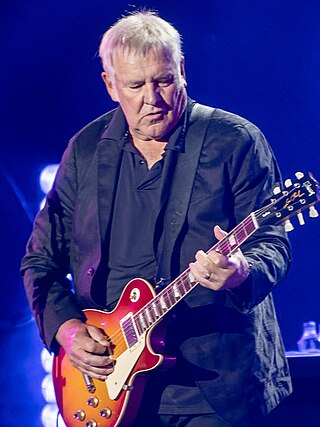
Aleksandar Živojinović, known professionally as Alex Lifeson, is a Canadian musician, best known as the guitarist for the rock band Rush. In 1968, Lifeson co-founded a band that would later become Rush, with drummer John Rutsey and bassist and lead vocalist Jeff Jones. Jones was replaced by Geddy Lee a month later, and Rutsey was replaced by Neil Peart in 1974, after which the lineup remained unchanged until the band's dissolution in 2018. Lifeson was the only member of Rush who stayed in the band throughout its entire existence, and he and Lee were the only members to appear on all of the band's albums.

Geddy Lee Weinrib is a Canadian musician, best known as the lead vocalist, bassist, and keyboardist for the rock group Rush. Lee joined the band in September 1968 at the request of his childhood friend Alex Lifeson, replacing original bassist and frontman Jeff Jones. Lee's solo effort, My Favourite Headache, was released in 2000.

Kubla Khan: or A Vision in a Dream is a poem written by Samuel Taylor Coleridge, completed in 1797 and published in 1816. It is sometimes given the subtitles "A Vision in a Dream" and "A Fragment." According to Coleridge's preface to Kubla Khan, the poem was composed one night after he experienced an opium-influenced dream after reading a work describing Shangdu, the summer capital of the Mongol-led Yuan dynasty of China founded by Kublai Khan. Upon waking, he set about writing lines of poetry that came to him from the dream until he was interrupted by "a person on business from Porlock". The poem could not be completed according to its original 200–300 line plan as the interruption caused him to forget the lines. He left it unpublished and kept it for private readings for his friends until 1816 when, at the prompting of Lord Byron, it was published.

Rush was a Canadian rock band that primarily comprised Geddy Lee, Alex Lifeson (guitar) and Neil Peart. The band formed in Toronto in 1968 with Lifeson, drummer John Rutsey, and bass guitarist/vocalist Jeff Jones, whom Lee immediately replaced. After Lee joined, the band went through several line-up changes before arriving at its classic power trio line-up with the addition of Peart in July 1974, who replaced Rutsey four months after the release of their self-titled debut album; this line-up remained intact for the remainder of the band's career.
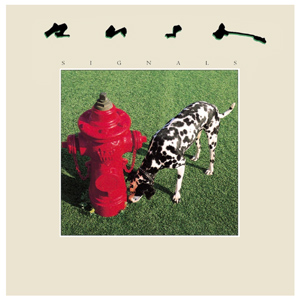
Signals is the ninth studio album by Canadian rock band Rush, released on September 9, 1982 by Anthem Records. After the release of their previous album, Moving Pictures, the band started to prepare material for a follow-up during soundchecks on their 1981 concert tour and during the mixing of their subsequent live album Exit...Stage Left. Signals demonstrates the group's continuing use of synthesizers, sequencers, and other electronic instrumentation. It is the last album produced by their longtime associate Terry Brown, who had worked with them since 1974.
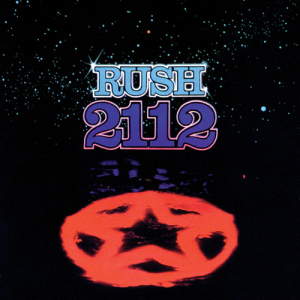
2112 is the fourth studio album by Canadian rock band Rush, released in March 1976 by Mercury Records. It reached No. 5 in Canada and became the band's commercial breakthrough in the US, peaking at No. 61.
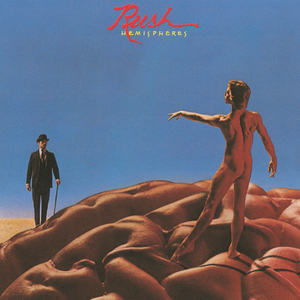
Hemispheres is the sixth studio album by Canadian rock band Rush, released in October 1978 by Anthem Records. After touring to support the band's previous release, A Farewell to Kings, during which the group gained popularity in the UK, Rush started work on their next album. As with the band's previous studio album, Hemispheres was recorded at Rockfield Studios in Monmouthshire and Trident Studios in London with longtime engineer and arranger, Terry Brown. Rush continued its progressive rock sound with the side-long "Cygnus X-1 Book II: Hemispheres" and the nine-minute instrumental "La Villa Strangiato", which was the band's first instrumental piece.

A Farewell to Kings is the fifth studio album by Canadian rock band Rush, released on Anthem Records on August 29, 1977. The album reached No. 11 in Canada and marked a growth in the band's international fanbase, becoming their first Top 40 album in the US and the UK.
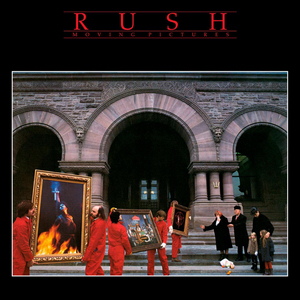
Moving Pictures is the eighth studio album by Canadian rock band Rush, released on February 12, 1981 by Anthem Records. After touring to support their previous album, Permanent Waves (1980), the band started to write and record new material in August 1980 with longtime co-producer Terry Brown. They continued to write songs with a more radio-friendly sound, featuring tighter and shorter song structures compared to their earlier albums.

Permanent Waves is the seventh studio album by Canadian rock band Rush, released on January 14, 1980, through Anthem Records. After touring to support their previous album, Hemispheres (1978), the band began working on new material for a follow-up in July 1979. This material showed a shift in the group's sound towards more concise arrangements and radio-friendly songs, though their progressive rock blueprint is still evident on "Jacob's Ladder" and the nine-minute closer "Natural Science." Bassist/vocalist Geddy Lee also employed a more restrained vocal delivery compared to previous albums. Permanent Waves was first of seven studio albums that the band recorded at Le Studio in Morin-Heights, Quebec with production handled by the group and Terry Brown.

Exit... Stage Left is the second live album by the Canadian rock band Rush, released as a double album in October 1981 by Anthem Records. After touring in support of their eighth studio album Moving Pictures (1981), the band gathered recordings made over the previous two years and constructed a live release from them with producer Terry Brown. The album features recordings from June 1980 on their Permanent Waves (1980) tour, and from March 1981 on their Moving Pictures tour.

Power Windows is the eleventh studio album by Canadian rock band Rush, released on October 11, 1985 in Canada by Anthem Records and on October 21, 1985 in the United States. After touring in support of their previous album, Grace Under Pressure (1984), the band took a break and reconvened in early 1985 to begin work on a follow-up. The material continued to display the band's exploration of synthesizer-oriented music, this time with the addition of sampling, electronic drums, a string section, and choir, with power being a running lyrical theme. Power Windows was recorded in Montserrat and England with Peter Collins as co-producer and Andy Richards on additional keyboards.
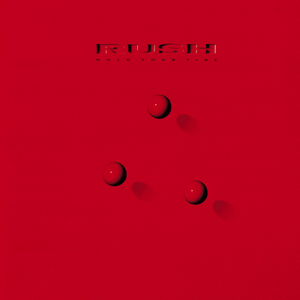
Hold Your Fire is the twelfth studio album by Canadian rock band Rush, released on September 8, 1987. It was recorded at The Manor Studio in Oxfordshire, Ridge Farm Studio in Surrey, Air Studios in Montserrat and McClear Place in Toronto. Hold Your Fire was the last Rush studio album released outside Canada by PolyGram/Mercury. 'Til Tuesday bassist and vocalist Aimee Mann contributed vocals to "Time Stand Still" and appeared in the Zbigniew Rybczyński-directed video.

Counterparts is the fifteenth studio album by Canadian rock band Rush, released October 19, 1993, on Anthem Records. After the band finished touring its previous album Roll the Bones (1991) in mid-1992, the members took a break before starting work on a follow-up.

Different Stages is a live album by Canadian rock band Rush, released in 1998. The bulk of the first and second discs were recorded at the World Music Theatre in Tinley Park, Illinois, during the 1997 Test for Echo tour. Five other songs from various stops along the tour were included and three songs from the 1994 Counterparts tour. The third disc is taken from a performance at the Hammersmith Odeon in London during the A Farewell to Kings tour in 1978.

The Spirit of Radio: Greatest Hits 1974–1987 is a compilation album by Canadian rock band Rush, released on February 11, 2003. It includes many of the band's most popular songs from their Mercury Records era, but does not feature any material from their third album Caress of Steel. A special edition of the album included a DVD containing music videos for several songs, including "Mystic Rhythms".

Exit... Stage Left is a concert film by the Canadian band Rush that premiered on MTV in February 1982 and then released on CED, Laserdisc, Betamax, VHS and DVD at various times between 1982 and 2007. It documents a live concert performance by the band on their 1981 Moving Pictures tour. In October 1981, the band released an audio album of the same name of the same performance at the Montreal Forum, in Montreal, Quebec on vinyl LP, audiocassette, 8-track cartridge and (later) compact disc. The video has a different track list from the album, as well as voice-over comments from the band members about songwriting and performing. The four songs from the European dates of the Permanent Waves tour, included on the audio album, are not included on the video.
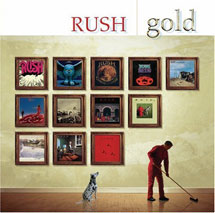
Gold is a compilation album by Canadian rock band Rush, released on April 25, 2006.

"Headlong Flight" is the second single from Canadian rock band Rush's 19th studio album, Clockwork Angels. It was released to radio stations and for online preview on April 19, 2012, and became available digitally and on disk April 24, 2012. A lyrics video was also made available on YouTube. In an interview with Rolling Stone, Geddy Lee commented on the song:
'Headlong Flight' was one of those songs that was a joy to write and record from beginning to end. Alex [Lifeson] and I had blast jamming in my home studio one day before the second leg of the Time Machine tour, and I did not revisit that jam until a year later. Alex and I assembled the song to be an instrumental and its original title was 'Take That Lampshade Off Yo Head!,' but once we saw the lyrics Neil [Peart] had written, I knew that the spirit of the lyrics matched the instrumental perfectly and it was just a matter of making them fit and writing the melodies.


















